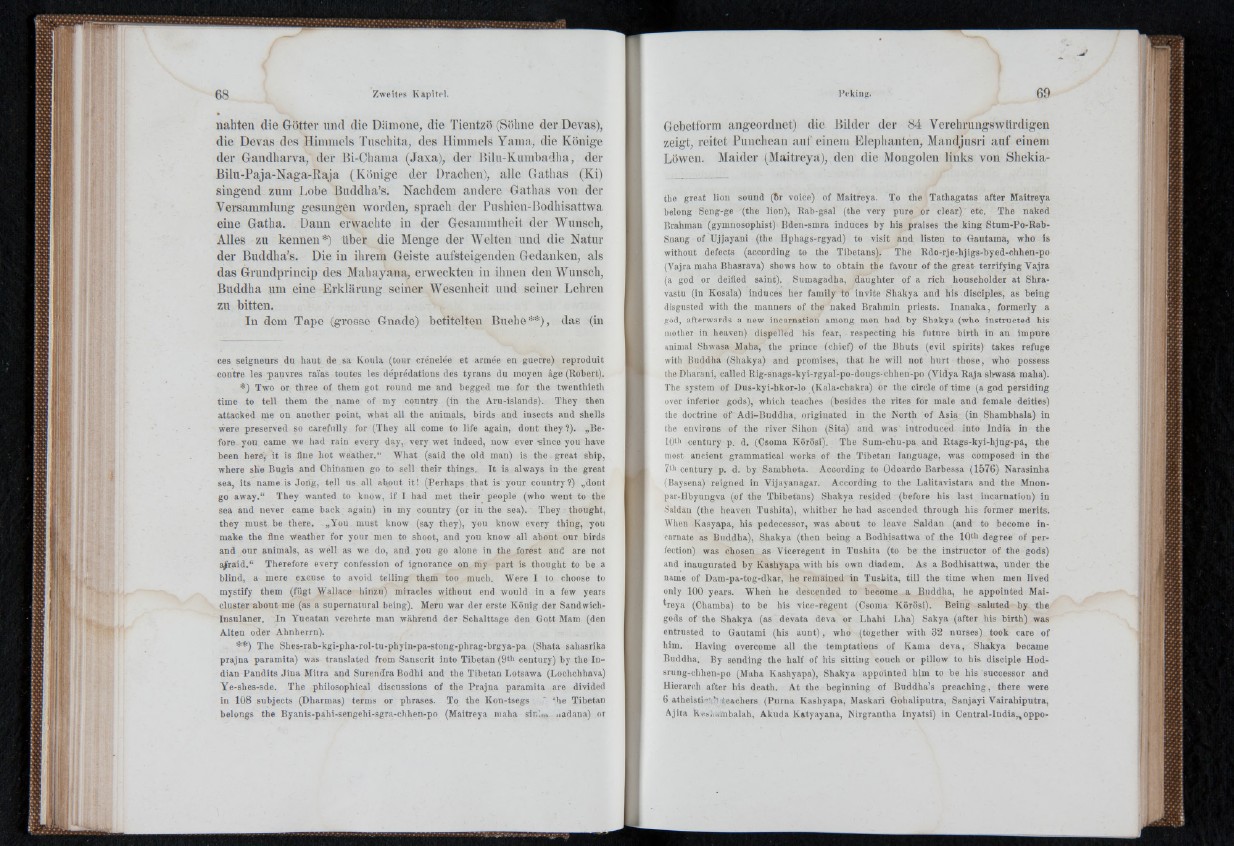
nahten die Götter und die Dümone, die Tientzö (Söhne der Devas),
die Devas des Himmels Tnschita, des Himmels Yama, die Könige
der Gandharva, der Bi-Chama (Jaxa), der Bilu-Kumbadlia, der
Bilu-Paja-Naga-Raja (Könige der Drachen), alle Gathas (Ki)
singend zum Lobe Buddha’s. Nachdem andere Gathas von der
Versammlung gesungen worden, sprach der Pushien-ßodhisattwa
eine Gatha. Dann erwachte in der Gesammtheit der Wunsch,
Alles zu kennen*) über die Menge der Welten und die Natur
der Buddha’s. Die in ihrem Geiste aufsteigenden Gedanken, als
das Grundprincip des Mahayana, erweckten in ihnen den Wunsch,
Buddha um eine Erklärung seiner Wesenheit und seiner Lehren
zu bitten.
In dem Tape (grosse Gnade) betitelten Buche**), das (in
ces seigneurs du haut de sa Koula (tour crénelée et armée en guerre) reproduit
contre les ■pauvres raïas toutes les déprédations des tyrans du moyen âge (Robert).
*) Two or three of them got round me and begged me for the twenthieth
time to tell them the name of my country (in the Aru-islands). They then
attacked me on another point, what all the animals, birds and insects and shells
were preserved so carefully for (They all come to life again, dont they ?). „Before
you came we had rain every day,, very wet indeed, now ever since you have
been here.- it is fine hot weather.“ What (said the old man) is the great ship,
where she Bugis and Chinamen go to sell their things. I t is always in the great
sea, its name is Jong, tell us all abput it! (Perhaps that is your country?) „dont
go away.“ They wanted to know, if I had met their people (who went to the
sea and never came back again) in my conntry (or in the sea). They thought,
they must be there. „You must know (say they), you know every thing, you
make the fine weather for your men to shoot, and you know all about our birds
and our animals, as well as we do, and you go alone in the forest and are not
a/raid.“ Therefore every confession of ignorance on my part is thought to be a
blind, a mere excuse to avoid telling them too much. Were I to choose to
mystify them (fügt Wallace hinzu) miracles without end would in a few years
cluster about me (as a supernatural being). Meru war der erste König der Sandwich-
Insulaner. In Yucatan verehrte man während der Schalttage den Gott Mam (den
Alten oder Ahnherrn).
**) The Shes-rab-kgi-pha-rol-tu-phyinrpa-stong-phrag-brgya-pa (Shata sahasrika
prajna paramita) was translated from Sanscrit into Tibetan (9th century) by the Indian
Pandits Jin a Mitra and Surendra Bodhi and the Tibetan Lotsawa (Lochchhava)
Ye-shes-sde. The philosophical discussions of the Prajna paramita are divided
in 108 subjects (Dharmas) terms or phrases. To the Kon-tsegs " ‘he Tibetan
belongs the Byanis-pahi-sengehi-sgra-chhen-po (Maitreya maha sin'.«,, uadana) or
Gebetform angeordnet) die Bilder der 84 Verehrungswürdigen
zeigt, reitet Punchean auf einem Elephanten, Mandjusri auf einem
Löwen. Maider (Maitreya), den die Mongolen links von Shekiathe
great lion sound (br voice) of Maitreya. To the Tathagatas after Maitreya
belong Seng-ge (the lion), Rab-gsal (the very pure or clear) etc. The naked
Brahman (gymnosophist) Bden-smra induces by his praises the king Stum-Po-Rab-
Snang of Djjayani (the Hphags-rgyad) to visit and listen to Gautama, who is
without defects (according to the Tibetans). The Rdo-rje-hjigs-byed-chhen-po
(Vajra maha Bhasrava) shows how to obtain the favour of the g re at terrifying V ajra
(a god or deified saint). Sumagadha, daughter of a rich householder at Shra-
vastu (in Kosala) induces her family to invite Shakya and his disciples, as being
disgusted with the manners of the naked Brahmin priests. Inanaka, formerly a
god, afterwards a new incarnation among men had by Shakya (who instructed his
mother in heaven) dispelled his fear, respecting his future birth in an impure
animal Shwasa Maha, the prince (chief) of the Bhuts (evil spirits) takes refuge
with Buddha (Shakya) and promises, that he will not h u rt those, who possess
the Dharani, called Rig-snags-kyi-rgyal-po-dougs-chhen-po (Vidya Raja shwasa maha).
The system of Dus-kyi-hkor-lo (Kala-chakra) or the circle of time (a god persiding
over inferior gods), which teaches (besides the rites for male and female deities)
the doctrine of Adi-Buddha, originated in the North of Asia (in Shambhala) in
the environs of the river Sihon (Sita) and was' introduced into India in the
10th century p. d. (Csoma Korosi). The Sum-chu-pa and Rtags-kvi-hjng-pa, the
most ancient grammatical works of the Tibetan language, was composed in the
7th century p. d. by Sambhota. According to Odoardo Barbessa (1576) Narasinha
(Baysena) reigned in Vijayanagar. According to the Lalitavistara and the Mnon-
par-Hbyungva (of the Thibetans) Shakya resided (before his last incarnation) in
Saldan (the heaven Tushita), whither he had ascended through his former merits.
When Kasyapa, his pedecessor, was about to leave Saldan (and to become incarnate
as Buddha), Shakya (then being a Bodhisattwa of the lQth degree of perfection)
was chosen as Viceregent in Tushita (to be the instructor of the gods)
and inaugurated by Kashyapa with his own diadem. As a Bodhisattwa, under the
name of Dam-pa-tog-dkar, he remained in Tushita, till the time when men lived
only 100 years. When he descended to become a Buddha, he appointed Mai-
'1reya (Chamba) to be his vice-regent (Csoma Korosi). Being saluted by the
gods of the Shakya (as devata deva or Lhahi Lha) Sakya (after his birth) was
entrusted to Gautami (his au n t), who (together with 32 nurses) took care of
him. Having overcome all the temptations of Kama deva, Shakya became
Buddha. By sending the half of his sitting couch or pillow to his disciple Hod-
srung-chhen-po (Maha Kashyapa), Shakya appointed him to be his successor and
Hierarch after his death. At the beginning of Buddha’s preaching, there were
6 atheisti"' '' teachers (Purna Kashyapa, Maskari Gohaliputra, Sanjayi Vairahiputra,
Ajita Kcs.i.iinbalah, Akuda Katyayana, Nirgrantha Inyatsi) in Central-Iudia^oppo